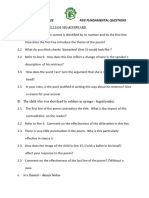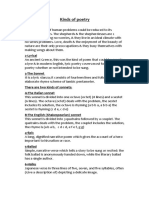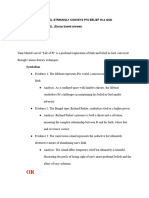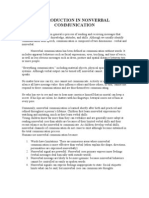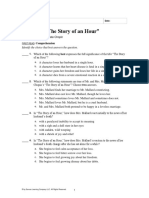British International School of Marbella
Mr Harper
Moudi Alangari
12a
AS LEVEL
English- Life of Pi
___
Notes
�Development of the relationship between Pi and Richard Parker:
"I was weeping because Richard Parker left me so unceremoniously. What a terrible thing it
is to botch a farewell." - This quote reflects Pi's initial attachment to Richard Parker and his sorrow
when the tiger disappears after their journey together.
"It was Richard Parker who calmed me down. It is the irony of this story that the one who scared me
witless to start with was the very same who brought me peace, purpose, I dare say even wholeness." - Pi
recognizes the transformative effect that Richard Parker has on him, shifting from fear to reliance and
even finding solace in the tiger's presence.
"With Richard Parker beside me, I couldn't help but wonder if I could have survived my ordeal at sea
alone." - Pi acknowledges the tiger's role in his survival, suggesting that Richard Parker's companionship
played a crucial part in his ability to endure the challenges they faced.
"It was Richard Parker who had given me a life. I wasn't going to let a human being take it away." - Pi
expresses his loyalty and gratitude towards Richard Parker, recognizing the tiger's importance in his
survival and refusing to betray him.
"I know zoos are no longer in people's good graces. Religion faces the same problem. Certain illusions
about freedom plague them both." - This quote highlights Pi's belief that both zoos and religion serve a
purpose in offering support and protection, drawing a parallel between the captivity of animals and the
comfort provided by faith.
Postmodernism: "Life of Pi" exhibits elements of postmodern literature, which challenges traditional
narratives and explores the subjective nature of reality. The novel raises questions about the reliability
of storytelling and the power of imagination. Applying postmodern theory, one can analyze how the
narrative structure of the novel blurs the lines between fact and fiction, leaving the reader to question
the nature of truth and the role of storytelling in shaping our understanding of the world.
Existentialism: Existentialist theory explores themes of individuality, freedom, and the search for
meaning in life. In "Life of Pi," Pi's journey at sea can be seen as an existential crisis, where he is faced
with isolation, fear, and the uncertainty of survival. Pi grapples with questions of identity and the
meaning of life, ultimately finding his own purpose and creating meaning in his extraordinary
circumstances.
Religious Pluralism: The novel delves into the theme of religious pluralism, which is the acceptance and
coexistence of different religious beliefs and practices. Pi practices three different religions
simultaneously: Hinduism, Christianity, and Islam. The theory of religious pluralism can be applied to
analyze how Pi's religious beliefs and practices provide him with strength, hope, and different
perspectives on faith and spirituality.
Metaphysics: Metaphysical theories explore the fundamental nature of reality, existence, and the
relationship between mind and matter. In "Life of Pi," Pi's experiences at sea and his relationship with
Richard Parker raise metaphysical questions about the nature of consciousness, the boundaries between
humans and animals, and the power of belief and perception in shaping our understanding of reality.
�The theme of FAITH in Life of Pi:
"Faith in God is an opening up, a letting go, a deep trust, a free act of love – but sometimes it was so hard
to love." - This quote highlights the challenging nature of faith and the struggle to maintain a strong
belief in God, even in the face of hardships.
"Doubt is useful for a while. We must all pass through the Garden of Gethsemane. If Christ played with
doubt, so must we." - Pi acknowledges the presence of doubt in matters of faith but suggests that it is a
necessary part of the journey, drawing a parallel to Christ's own experience in the Bible.
"Faith in God is an opening, a closing, a blind eye." - This quote suggests that faith sometimes requires a
suspension of disbelief or the ability to overlook certain contradictions or uncertainties.
"I know zoos are no longer in people's good graces. Religion faces the same problem. Certain illusions
about freedom plague them both." - Pi draws a parallel between zoos and religion, suggesting that faith
can be seen as an illusion or a construct that provides comfort and protection.
"To choose doubt as a philosophy of life is akin to choosing immobility as a means of transportation." -
This quote implies that faith is a choice and an active pursuit, contrasting it with the stagnation of doubt
and inaction.
Kierkegaard's Leap of Faith: Søren Kierkegaard, a philosopher and theologian, proposed the idea of a
"leap of faith." This theory suggests that faith involves a subjective and passionate commitment to beliefs
that cannot be rationally proven. In "Life of Pi," Pi's unwavering faith in God despite the challenges he
faces can be seen as a leap of faith, emphasizing the importance of personal commitment and trust in the
absence of empirical evidence.
William James' Pragmatism: William James, an American philosopher, introduced the concept of
pragmatism, which focuses on the practical consequences of beliefs. According to this theory, beliefs are
justified by their positive impact on a person's life. In the novel, Pi's faith in God provides him with hope,
strength, and a sense of purpose, demonstrating the pragmatic value of faith in navigating life's
challenges.
Paul Tillich's Ultimate Concern: Paul Tillich, a theologian and philosopher, argued that faith involves
an ultimate concern—a deep and meaningful orientation of one's life toward something of ultimate
importance. In "Life of Pi," Pi's faith in God represents his ultimate concern, shaping his worldview,
values, and actions. The theory supports the idea that faith provides a sense of meaning and purpose in
life.
Existentialism and the Absurd: Existentialist philosophers, such as Albert Camus, explored the concept
of the absurd—the inherent lack of meaning or purpose in the universe. In the face of the absurd,
individuals are challenged to create their own meaning. Pi's faith can be seen as a response to the
absurdity of his circumstances, providing him with a framework for finding meaning and hope amidst
chaos and isolation.
The Power of Belief and Perception: Various psychological theories, such as the placebo effect and
cognitive-behavioral therapy, emphasize the power of belief and perception in shaping our experiences
and outcomes. In "Life of Pi," Pi's faith influences his interpretation of events and his ability to endure,
highlighting the transformative power of belief and its impact on one's perception of reality.
�The theme of SURVIVAL in Life of Pi:
"I had to stop hoping so much that a ship would rescue me. I should not count on outside help. Survival
had to start with me. In my experience, a castaway's worst mistake is to hope too much and to do too
little. Survival starts by paying attention to what is close at hand and immediate." - This quote
emphasizes the importance of self-reliance and taking immediate action in order to survive, rather than
relying solely on external help.
"The lower you are, the higher your mind will want to soar." - Pi reflects on his dire circumstances and
acknowledges that the greater the challenges one faces, the stronger the will to survive becomes.
"Life on a lifeboat isn't much of a life. It is like an endgame in chess, a game with few pieces. The
elements couldn't be more simple, nor the stakes higher." - This quote underscores the harsh reality of
survival in a lifeboat, where the basic necessities become paramount, and every decision and action is
critical for staying alive.
"It is the plain truth: without Richard Parker, I wouldn't be alive today to tell you my story." - Pi
acknowledges the vital role that Richard Parker, the Bengal tiger, plays in his survival. The quote
highlights the unlikely alliance between humans and animals in extreme circumstances.
"The presence of God is the finest of rewards." - Pi finds solace in his faith, believing that the presence of
God provides him with strength and a sense of purpose in his struggle for survival.
Darwin's Theory of Natural Selection: Charles Darwin's theory of natural selection suggests that
individuals with advantageous traits are more likely to survive and reproduce. In "Life of Pi," Pi's survival
can be analyzed through the lens of natural selection as he adapts to his environment, overcomes
challenges, and utilizes his skills and resources to increase his chances of survival.
Maslow's Hierarchy of Needs: Abraham Maslow's hierarchy of needs theory posits that individuals have
a hierarchy of needs, ranging from basic physiological needs to higher-level psychological needs. Pi's
survival journey can be examined in terms of meeting these needs, from securing food and shelter to
finding companionship and a sense of purpose, ultimately aiming to achieve self-actualization.
Viktor Frankl's Logotherapy: Viktor Frankl's logotherapy focuses on finding meaning in life, even in the
face of suffering. Pi's quest for survival can be seen through the lens of logotherapy as he navigates the
challenges of isolation, fear, and uncertainty, striving to find meaning and purpose in his circumstances.
Ernest Becker's Terror Management Theory: Ernest Becker's terror management theory explores how
individuals cope with the existential fear of mortality. Pi's survival journey can be analyzed in terms of
his attempts to manage and overcome the fear of death, utilizing his faith, resilience, and resourcefulness
as adaptive strategies in the face of mortality.
Social Exchange Theory: Social exchange theory suggests that individuals engage in relationships and
exchanges based on the expectation of mutual benefits. Pi's survival can be examined from a social
exchange perspective as he forms a symbiotic relationship with Richard Parker, where both parties
benefit from each other's presence and actions, contributing to their shared survival.




































